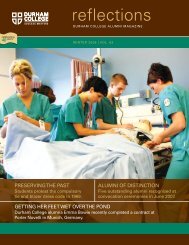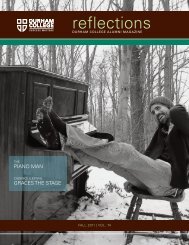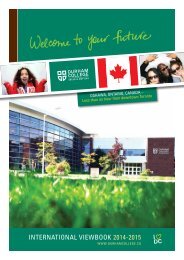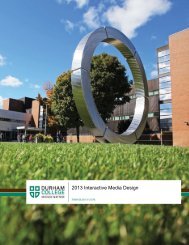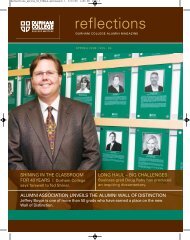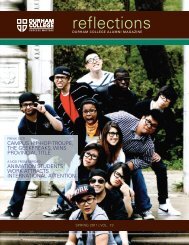Download - Durham College
Download - Durham College
Download - Durham College
You also want an ePaper? Increase the reach of your titles
YUMPU automatically turns print PDFs into web optimized ePapers that Google loves.
Heating, Ventilation & Air Conditioning Techniques<br />
Gas Technician 2<br />
Program Guide<br />
School of Skilled Trades,<br />
Apprenticeship and Renewable<br />
Technology<br />
Page 1 of 36
Table of Contents<br />
Welcome Students.......................................................................................................................................................3<br />
Program Faculty & Staff...............................................................................................................................................5<br />
<strong>Durham</strong> <strong>College</strong> Vision and Values .............................................................................................................................8<br />
The Student Experience Comes First ..........................................................................................................................9<br />
Important Dates ........................................................................................................................................................10<br />
Program Information ................................................................................................................................................19<br />
- program description<br />
- program learning outcomes<br />
Course Outlines ........................................................................................................................................................21<br />
General Education ....................................................................................................................................................21<br />
Academic Honesty ....................................................................................................................................................22<br />
Requirements for Promotion ....................................................................................................................................22<br />
Aegrotat and Missed Final Examinations ..................................................................................................................23<br />
Academic Advising ‐ Student Liaison .........................................................................................................................24<br />
Centre for Students with Disabilities .........................................................................................................................25<br />
Student Academic Learning Services (Learner Support Centre) ................................................................................26<br />
The Library .................................................................................................................................................................27<br />
<strong>College</strong> Publications ...................................................................................................................................................28<br />
Scholarships and Bursaries .........................................................................................................................................29<br />
Transfer Guide ............................................................................................................................................................31<br />
Program of Studies .....................................................................................................................................................32<br />
Course Descriptions ....................................................................................................................................................34<br />
Please note the following important information:<br />
<strong>Durham</strong> <strong>College</strong> strives to ensure the accuracy of the information in this publication. Please note that the academic curriculum is continually<br />
reviewed and revised to ensure program quality and relevancy. As such, the college reserves the right to modify or cancel any course, program,<br />
fee, procedure, timetable or campus location at any time. Please consult our website at www.durhamcollege.ca for the most current<br />
information. Printed: June 2010<br />
Page 2 of 36
Welcome Students<br />
A Message from the Dean<br />
Welcome to <strong>Durham</strong> <strong>College</strong>’s School of Skilled Trades, Apprenticeship, and<br />
Renewable Technology at Whitby. You are beginning a career path of your choice<br />
and our faculty and staff are committed to helping you achieve your goals.<br />
To do this, our faculty, who are dedicated professionals chosen from your field of<br />
study, have developed relevant programs of study and look forward to engaging<br />
you to achieve success in your program. These courses of study are a mix of both<br />
theoretical and hands-on activities that are appropriate to your career field. Our<br />
classroom and shop facilities are well equipped and designed to support your<br />
learning experience. Your time at <strong>Durham</strong> <strong>College</strong> is an opportunity for<br />
concentrated study to prepare for your career. Please use your time here to your<br />
best advantage.<br />
Our faculty and staff take pride in our mission to provide a progressive and<br />
motivating learning environment to produce exceptional graduates who meet<br />
industry expectations. If at any time you require help please feel free to approach<br />
our faculty and staff for assistance. Your success matters to us!<br />
Welcome<br />
Norm Fenton<br />
Dean, School of Skilled Trades, Apprenticeship and Renewable Technology<br />
Page 3 of 36
A Message from the Vice‐President Academic<br />
Congratulations on choosing <strong>Durham</strong> <strong>College</strong> and taking a very important step in preparing for your<br />
future. <strong>Durham</strong> <strong>College</strong> is known for high quality programs, leading edge technology, an award winning<br />
library and a student‐centered approach to learning. Supporting our mission that the student<br />
experience comes first, <strong>Durham</strong> <strong>College</strong> is committed to providing students with quality learning<br />
experiences and support in finding fulfillment in education, employment and lifelong learning.<br />
Our programs are continually shaped by market needs and delivered by exceptional teachers with realworld<br />
experience. The program you have chosen has been designed to help you develop the necessary<br />
skills and knowledge to support your success in your chosen career path. Our dedicated and<br />
professional staff and professors are committed to helping you achieve your educational goals and your<br />
career aspirations.<br />
<strong>Durham</strong> <strong>College</strong> strives to be accountable to students and employers through the preparation of workready<br />
graduates who will continue to live our “success matters” focus in their professional work<br />
environment.<br />
We are pleased you have chosen to study at <strong>Durham</strong> <strong>College</strong> and we look forward to supporting your<br />
learning journey – work hard, have fun, enjoy your college experience and campus life.<br />
I wish you much success with your studies.<br />
Judy Robinson,<br />
Vice President, Academic<br />
Page 4 of 36
School of Skilled Trades, Apprenticeship<br />
Renewable Technology<br />
Whitby Faculty & Staff<br />
Individuals may be contacted by dialing directly (905) 721-2000, followed by the appropriate<br />
extension.<br />
Administration Title Phone E-mail Address<br />
Fenton, Norm Dean 3302 (W) norm.fenton@durhamcollege.ca<br />
Chard, Shelley Student Liaison 4087 (W) shelley.chard@durhamcollege.ca<br />
Martin, Julie Administrative Assistant -Apprenticeship 3344 (W) julie.martin@durhamcollege.ca<br />
Moore, Sue Manager – Academic Operations 4040 (W) sue.moore@durhamcollege.ca<br />
Nippard, Anne Purchasing (Central Stores) 4043 (W) anne.nippard@durhamcollege.ca<br />
Nokes, Rob Technologist, Pipe Trades 4074 (W) robert.nokes@durhamcollege.ca<br />
Parker, Greg Technologist, IMM 4079 (W) gregory.parker@durhamcollege.ca<br />
Pearce, Mary Administrative Coordinator 4025 (W) mary.pearce@durhamcollege.ca<br />
Stairs, Gary Technologist, Motive Power 4073 (W) gary.stairs@durhamcollege.ca<br />
Tamlin, Brad Technologist, Electrical 4312 (W) brad.tamlin@durhamcollege.ca<br />
Zilstra, Don Technologist, Machining 4079 (W) don.zilstra@durhamcollege.ca<br />
Faculty Department Phone Office Email Address<br />
Beals, David PET 4042 1112 david.beals@durhamcollege.ca<br />
Bremner, Robert Motive Power 4055 185 robert.bremner@durhamcollege.ca<br />
Brooks, Graham Electrical 4051 179 graham.brooks@durhamcollege.ca<br />
Bruyea, Lindsay Electrical 4063 195 lindsay.bruyea@durhamcollege.ca<br />
Chilton, Bill Electrical 4046 1108 bill.chilton@durhamcollege.ca<br />
Cholmondeley, John Motive Power 4059 190 john.cholmondeley@durhamcollege.ca<br />
Coady, Glenn Plumbing 4088 1105 glenn.coady@durhamcollege.ca<br />
Cook, Mike Electrical 3342 187 mike.cook@durhamcollege.ca<br />
Cooney, Martin Communications 4061 193 martin.cooney@durhamcollege.ca<br />
Cornish, Clair Online 3328 1113 clair.cornish@durhamcollege.ca<br />
Cunningham, Colin MTNT/Machining 4066 194 colin.cunningham@durhamcollege.ca<br />
Cunningham, Tom Electrical 4058 184 thomas.cunningham@durhamcollege.ca<br />
Deline, Rodney Electrical 3342 187 rodney.deline@durhamcollege.ca<br />
Dewar, Dave Electrical 4097 186 dave.dewar@durhamcollege.ca<br />
Eustace, Richard MTNT/Machining 4096 1104 richard.eustace@durhamcollege.ca<br />
Fernandes, Luiz Energy 4026 1103 luiz.fernandes@durhamcollege.ca<br />
Fielding, Steve Electrical 4003 180 stephen.fielding@durhamcollege.ca<br />
Forderer, Henry MTNM/IMM 4065 198 henry.forderer@durhamcollege.ca<br />
Foss, Ron Motive Power 4057 1106 ron.foss@durhamcollege.ca<br />
Gambier, Michael PET 4042 1112 mike.gambier@durhamcollege.ca<br />
Godfrey, Craig Precision Metal 4072 Central craig.godfrey@durhamcollege.ca<br />
Page 5 of 36
Fabrication<br />
Stores<br />
Grant, Bob Motive Power 4067 199 robert.grant@durhamcollege.ca<br />
Griffin, Peter Energy 4060 191 peter.griffin@durhamcollege.ca<br />
Hardy, John Welding 4045 1109 john.hardy@durhamcollege.ca<br />
Haynes, Doug Electrical 4046 1108 doug.haynes@durhamcollege.ca<br />
Heale, Robert Electrical 4086 1107 robert.heale@durhamcollege.ca<br />
Hewton, Mark Motive Power 4057 1106 mark.hewton@durhamcollege.ca<br />
Kelly, Ben Electrical 4019 197 ben.kelly@durhamcollege.ca<br />
Marley, Tom MTNM/IMM 4064 196 tom.marley@durhamcollege.ca<br />
Martin, Al Mathematics 4069 1101 al.martin@durhamcollege.ca<br />
Moran, Greg Energy 4060 191 greg.moran@durhamcollege.ca<br />
Murdock Don Energy 4069 1101 don.murdock@durhamcollege.ca<br />
Noordstra, Gary MTNM/IMM/Online 4081 1111 gary.noordstra@durhamcollege.ca<br />
Platnar, John Plumbing 4088 1105 john.platnar@durhamcollege.ca<br />
Poirier, Tony Electrical 4051 179 tony.poirier@durhamcollege.ca<br />
Precoor, Wayne Motive Power 4067 199 wayne.precoor@durhamcollege.ca<br />
Prior, Andrew MTNT/Machining 4071 1102 andrew.prior@durhamcollege.ca<br />
Quantrill, Steve Motive Power 4063 195 steve.quantrill@durhamcollege.ca<br />
Ruffo, Ralph Motive Power 4059 190 ralph.ruffo@durhamcollege.ca<br />
Ryan, Mike Plumbing 4054 182 mike.ryan@durhamcollege.ca<br />
Sauve, Dan HVAC 4005 1110 daniel.sauve@durhamcollege.ca<br />
Smyth, Roy MTNT/Machining 4066 194 roy.smyth@durhamcollege.ca<br />
St. Arnaud, Jean MTNT/Machining 4062 188 jean.st.arnaud@durhamcollege.ca<br />
Trauzzi, Ralph Electrical 4003 180 ralph.trauzzi@durhamcollege.ca<br />
Voynov, Violin Electrical 4086 1107 violin.voynov@durhamcollege.ca<br />
Watkins, Dave Gas Technician 2 4061 193 david.watkins@durhamcollege.ca<br />
Wood, Jerry Plumbing 4058 184 jerry.wood@durhamcollege.ca<br />
Page 6 of 36
Office of the Registrar – Whitby Campus responds to general inquiries and provides<br />
course information and registration for post-secondary, apprenticeship and continuous<br />
education programs.<br />
Important Numbers<br />
Accounting, General Information (Oshawa) 3020<br />
Admissions, Whitby 4041<br />
Athletic Complex, Oshawa 3040<br />
Bookstore, Oshawa 3026<br />
Bookstore, Whitby 3306<br />
Centre for Students with Disabilities, Oshawa 3123<br />
Continuing Education, Whitby 3332/3330<br />
Dental Clinic, Oshawa 3074<br />
Financial Aid, Oshawa 3036<br />
Financial Aid, Whitby (Wednesday only) 4010<br />
General Program/Registration Information 3300<br />
Hired Career Services Whitby 3343<br />
Housing, Oshawa 2472<br />
Learning Commons 4015<br />
Library, Oshawa 2214<br />
Library/Media Services, Whitby 4015<br />
Peer Tutoring 4087<br />
Individuals may be contacted by dialing directly (905) 721-2000, followed by the appropriate<br />
extension.<br />
Page 7 of 36
Mission: The student experience comes first at <strong>Durham</strong><br />
<strong>College</strong><br />
Vision<br />
• <strong>Durham</strong> <strong>College</strong> is the premier college in Canada for career‐focused students who will<br />
succeed in a challenging, supporting and inclusive learning environment.<br />
• Our programs are continually shaped by market needs and delivered by exceptional<br />
teachers with real‐world experience.<br />
• Our vibrant campus community enriches the student life experience.<br />
All of this combines to ensure our graduates have the market‐ready skills to obtain great careers and<br />
make a difference in the world.<br />
Values<br />
Our values drive our organizational culture and our behaviour in delivering our vision and mission. They<br />
are:<br />
Integrity and Transparency…<br />
we will behave and communicate sincerely and honestly<br />
Respect…<br />
we will treat everyone with dignity and offer superior service<br />
Equality and Diversity…<br />
we will champion all learners and celebrate diversity<br />
Innovation…<br />
we will be leaders in market‐responsive learning experiences and solutions<br />
Personal and team accountability…<br />
we will do what we say we will do<br />
Page 8 of 36
THE STUDENT EXPERIENCE<br />
COMES FIRST AT DURHAM<br />
COLLEGE<br />
Important to All<br />
Students and staff at <strong>Durham</strong> <strong>College</strong> are committed to academic excellence by:<br />
• Demonstrating respect for one another and property<br />
• Maintaining a clean and safe environment<br />
• Taking an active role in the learning process<br />
• Providing and receiving support when necessary<br />
• Attending classes and/or appointments regularly and on time<br />
• Modeling skills, attitudes and expectations of the workplace<br />
Support Staff<br />
• Provide professional quality customer service to students and staff<br />
• Direct students and staff to appropriate resources<br />
• Support and assist students in their learning and career goals<br />
• Promote services that enhance student success<br />
Faculty<br />
• To be positive, enthusiastic, patient and flexible<br />
• To be in the class early and prepared to begin on time<br />
• To keep current in academic and professional knowledge<br />
• To be prepared for activities, exercises and demonstrations<br />
• To be available and show willingness to help students<br />
• To ensure that all students get equal assistance and time<br />
• To perform evaluations according to established criteria and within a reasonable time frame<br />
• To return and take up any assigned homework, assignments, tests and projects promptly<br />
• To identify students requiring remedial assistance, and to direct those students to the appropriate services<br />
• To write constructive and helpful statements when evaluating student assignments<br />
• To use a variety of teaching, questioning, and assessment techniques<br />
• To motivate and engage learners in active and collaborative learning<br />
• To encourage student participation and feedback wherever possible<br />
• To effectively use learning technology<br />
• To outline professional responsibilities, career alternatives, and avenues for further education following graduation<br />
• To provide a course outline to each student at the beginning of the course, to review the outline with the students, and to<br />
adhere to the outline<br />
• To adhere to <strong>Durham</strong> <strong>College</strong> policies, procedures and guidelines<br />
• To place the safety and well being of the student above all other objectives, including fulfilling education obligations<br />
Students<br />
• To be prepared for class and professional practice activities. This will include reading appropriate textbook assignments<br />
prior to class and completing any homework assignments<br />
• To be in class and arrive on time<br />
• To participate in class activities<br />
• To demonstrate respect for all persons and the learning environment<br />
• To be trustworthy, honest, and accountable for own behaviour<br />
• To complete tests, assignments and evaluations as required, striving for excellence<br />
• To demonstrate effective communication skills<br />
• To understand all course requirements and to follow them<br />
• To seek assistance immediately if unable to follow the subject requirements for any reason<br />
• To read and adhere to <strong>Durham</strong> <strong>College</strong> policies, procedures and guidelines<br />
Administration<br />
• Meet or exceed standards of excellence<br />
• Manage budgets and resources<br />
• Support students and staff in meeting their responsibilities<br />
• Support/direct approved operational procedures<br />
• Communicate relevant information in a timely fashion<br />
• Be current in their field of leadership in a college environment<br />
Page 9 of 36
Important Dates 2010 – 2011<br />
Please note the dates of your semester examinations. Please ensure that you do not schedule vacation<br />
or employment during these times.<br />
FALL 2010 SEMESTER<br />
July 5, 2010<br />
Fees due date for first year students<br />
Web registration ‐ for 2 nd year students who have paid for fall<br />
semester ‐ begins.<br />
July 7, 2010<br />
July 12, 2010<br />
July 16, 2010<br />
August 30, 2010<br />
Web registration ‐ for 3 rd year students who have paid for fall<br />
semester ‐ begins.<br />
Web registration ‐ for 1 st year students who have paid for fall<br />
semester ‐ begins.<br />
Fees due date for returning students.<br />
Registration for part‐time Oshawa campus students begins and<br />
window opens for timetable changes.<br />
Apprenticeship Classes begin.<br />
September 6, 2010<br />
September 7, 2010<br />
September 8, 2010<br />
September 14, 2010<br />
Labour Day (no classes)<br />
Orientation for first‐year students.<br />
Classes begin for most programs.<br />
Last day for late program registration.<br />
Last day for fall semester course or program changes.<br />
September 21, 2010<br />
Last day for full‐time students to withdraw with full refund, less<br />
$100 administration fee. 1, 2<br />
Last day for refund eligibility when dropping to part‐time.<br />
Page 10 of 36
Last day for part‐time students to withdraw with tuition fee<br />
refund less an administration fee. 1, 2<br />
Last day to submit a Prior Learning Assessment and Recognition<br />
(PLAR) request for fall semester subjects.<br />
September 30, 2010<br />
October 4, 2010<br />
October 5, 2010<br />
Student Health Insurance Plan “Opt‐out” deadline.<br />
Due date for 2 nd instalment of Fall fees.<br />
Last day for application for fall semester subject<br />
exemption/credit.<br />
Last day for withdrawal from a fall semester subject with no<br />
academic record. Subjects dropped after this date, will be<br />
recorded on the academic transcript with a “W” to indicate<br />
withdrawal. 1, 2<br />
October 11, 2010<br />
October 21, 2010<br />
October 25, 2010<br />
November 18, 2010<br />
November 12, 2010<br />
November 12, 2010<br />
December 10, 2010<br />
December 13 to 17, 2010<br />
December 23, 2010<br />
Thanksgiving (no classes).<br />
Fall Convocation<br />
Deadline for submission of adjusted marks to clear INC grades<br />
from Summer 2010. INC grades after this date will revert to a<br />
fail.<br />
Scholarship Ceremony<br />
Winter 2011 semester fees due date.<br />
Last day to withdraw from a fall semester subject with no<br />
academic penalty. After this date, all subjects will be graded and<br />
recorded on the student’s transcript. 1, 2<br />
Last day of classes for most programs.<br />
Fall semester final examinations/evaluation(s) for<br />
postsecondary students. Students are reminded not to<br />
schedule vacation or employment hours during these times.<br />
January 5 and 6, 2011 scheduled as tentative snow dates for the<br />
Oshawa campus.<br />
Grades are available to view electronically as of 4 p.m. Note:<br />
official distribution date for the purpose of academic appeals is<br />
January 5, 2011.<br />
Page 11 of 36
Full‐time students may process timetable changes for the<br />
winter semester through MyCampus as of 4 p.m.<br />
December 24, 2010 –<br />
January 2, 2011 inclusive<br />
Campus closed for the holiday season.<br />
WINTER 2011 SEMESTER – JANUARY START<br />
November 12, 2010<br />
Winter 2011 semester fees due date.<br />
November 22, 2010 Web registration for Fall start 1 st year students for winter 2011<br />
semester courses begins.<br />
November 29, 2010 Web registration for 2 nd and 3 rd year students for winter 2011<br />
semester courses begins.<br />
December 6, 2010<br />
January 3, 2011<br />
Web registration for Winter start students begins.<br />
Registration for Oshawa campus part‐time students begins.<br />
Apprenticeship Classes begin<br />
January 5, 2011<br />
Classes begin for most programs.<br />
Official grade distribution date for the purpose of Academic<br />
Appeals.<br />
January 11, 2011<br />
Last day for late program registration.<br />
Last day for winter semester course or program changes.<br />
January 11, 13 and 15, 2011 Dates for missed exams from Fall Semester 2010<br />
January 18, 2011<br />
Last day for full‐time students, who started their program in<br />
September 2010, to withdraw with a refund of winter tuition<br />
fees. 1, 2 Ancillary fees and school supply fees are not refundable.<br />
Last day for full‐time students, who started their program in<br />
January 2011 to withdraw with a refund of full fees paid less<br />
$100 administration fee. 1, 2<br />
Last day for refund eligibility when dropping to part‐time.<br />
Last day to withdraw from part‐time studies with tuition fee<br />
refund less an administration fee per subject.<br />
Page 12 of 36
Last day to submit a Prior Learning Assessment and Recognition<br />
(PLAR) request for winter semester subjects.<br />
January 31, 2011<br />
January 31 to Feb 4<br />
February 1, 2011<br />
January start students only: Student Health Insurance Plan<br />
“Opt‐out” deadline.<br />
Winter Break week for Electrical Block Intermediate & Advanced<br />
apprenticeship students only.<br />
Last day for application for winter semester subject<br />
exemption/credit.<br />
Last day to withdraw from a January start subject with no<br />
academic record. Subjects dropped after this date, will be<br />
recorded on the academic transcript with a “W” to indicate<br />
withdrawal. 1, 2<br />
February 4, 2011<br />
February 18, 2011<br />
February 21, 2011<br />
Due date for 2 nd instalment of Winter fees.<br />
T2202As available online via MyCampus as of 4 p.m.<br />
Family Day (no classes).<br />
Deadline for submission of adjusted marks to clear INC grades<br />
from Fall 2010. INC grades after this date will revert to a fail.<br />
February 21 to 25<br />
February 28 to March 4<br />
March 18, 2011<br />
March 14 to 18, 2011<br />
Winter Break week; no classes with the exception of OFAD<br />
February start students and Apprenticeship students.<br />
Winter Break week for Apprenticeship students with the<br />
exception of Electrical Block Intermediate and Advanced<br />
students.<br />
Last day to withdraw from a January start subject with no<br />
academic penalty. After this date, all subjects will be graded and<br />
recorded on the student’s transcript. 1, 2<br />
Winter Break week for OYAP Apprentices only (except<br />
Hairstylists – please see your school office).<br />
April 8, 2011 Last day to apply to graduate – courses ending April 2011.<br />
April 14 2011<br />
April 15 to 21<br />
Last day of classes for most January start programs.<br />
Winter semester (January start) final examinations/<br />
evaluation(s); students are reminded not to schedule vacation<br />
or employment hours during these times.<br />
Page 13 of 36
April 22, 2011<br />
April 29, 2011<br />
Good Friday (no classes).<br />
Grades are available to view electronically as of 4 p.m. Official<br />
distribution date for the purpose of academic appeals.<br />
May 10, 12 and 14, 2011 Dates for Missed Exams from Winter Semester 2011.<br />
June 16 & 17, 2011<br />
Convocation (Times and location TBA)<br />
WINTER 2011 SEMESTER – FEBRUARY START<br />
December 10, 2010<br />
December 6, 2010<br />
January 31, 2011<br />
Winter 2011 ‐ February start ‐ semester fees due date.<br />
Web registration for February start students begins.<br />
February start classes begin.<br />
Registration for Oshawa campus part‐time students begins.<br />
February 4, 2011<br />
Last day for February start late program registration.<br />
Last day for February start course or program changes.<br />
February 11, 2011<br />
Last day for full‐time students, who started their programs in<br />
February 2011 to withdraw with a refund of full fees paid less<br />
$100 administration fee. 1, 2<br />
Last day for refund eligibility when dropping to part‐time for<br />
February start only.<br />
Last day for February start students to submit a Prior Learning<br />
Assessment and Recognition (PLAR) request for winter semester<br />
subjects.<br />
February 21, 2011<br />
Family Day (no classes).<br />
Deadline for submission of adjusted marks to clear INC grades<br />
from Fall 2010. INC grades after this date will revert to a fail.<br />
February 28, 2011<br />
February 28, 2011<br />
February start students only: Student Health Insurance Plan<br />
“Opt‐out” deadline.<br />
Last day for application for semester subject exemption/ credit.<br />
Last day to withdraw from a February start subject with no<br />
academic record. Subjects dropped after this date, will be<br />
Page 14 of 36
ecorded on the academic transcript with a “W” to indicate<br />
withdrawal. 1, 2<br />
March 4, 2011<br />
April 7, 2011<br />
April 22, 2011<br />
May 2 – 6, 2011<br />
May 6, 2011<br />
May 12, 2011<br />
October, 2011<br />
Due date for 2 nd instalment of Winter fees ‐ February start<br />
students only.<br />
Last day to withdraw from a February start subject with no<br />
academic penalty. After this date, all subjects will be graded and<br />
recorded on the student’s transcript. 1, 2<br />
Good Friday (no classes)<br />
Winter semester (February start) final examinations/<br />
evaluation(s); students are reminded not to schedule vacation<br />
or employment hours during these times.<br />
Last day of classes for most February start programs.<br />
Grades are available to view electronically as of 4 p.m. Official<br />
distribution date for the purpose of academic appeals.<br />
Convocation (Time and location TBA)<br />
WINTER 2011 SEMESTER – MARCH START<br />
December 6, 2010<br />
January 7, 2011<br />
February 28, 2011<br />
Web registration for March start students begins.<br />
Winter 2011 ‐ March start ‐ semester fees due date.<br />
March start classes begin.<br />
Registration for Oshawa campus part‐time students begins.<br />
March 4, 2011<br />
Last day for March start late program registration.<br />
Last day for March start course or program changes.<br />
March 11, 2011<br />
Last day for full‐time students, who started their programs in<br />
March 2011 to withdraw with a refund of full fees paid less<br />
$100 administration fee. 1, 2<br />
Last day for refund eligibility when dropping to part‐time for<br />
March start only.<br />
Page 15 of 36
Last day for March start students to submit a Prior Learning<br />
Assessment and Recognition (PLAR) request for winter semester<br />
subjects.<br />
March 25, 2011<br />
Last day for application for semester subject exemption/ credit.<br />
Last day to withdraw from a March start subject with no<br />
academic record. Subjects dropped after this date, will be<br />
recorded on the academic transcript with a “W” to indicate<br />
withdrawal. 1, 2<br />
March 31, 2011<br />
April 1, 2011<br />
April 22, 2011<br />
May 5, 2011<br />
June 3, 2011<br />
June 6 ‐ 10, 2011<br />
June 15, 2011<br />
October, 2011<br />
March start students only: Student Health Insurance Plan “Optout”<br />
deadline.<br />
Due date for 2 nd instalment of Winter fees – March start<br />
students only.<br />
Good Friday (no classes)<br />
Last day to withdraw from a March start subject with no<br />
academic penalty. After this date, all subjects will be graded and<br />
recorded on the student’s transcript. 1, 2<br />
Last day of classes for most March start programs.<br />
Winter semester (March start) final examinations/<br />
evaluation(s); students are reminded not to schedule vacation<br />
or employment hours during these times.<br />
Grades are available to view electronically as of 4 p.m. Official<br />
distribution date for the purpose of academic appeals.<br />
Convocation (Time and location TBA)<br />
SPRING 2011 SEMESTER<br />
March 11, 2011<br />
April 4, 2011<br />
May 9, 2011<br />
Spring 2011 semester fees due date.<br />
Web registration for Spring/Summer programs begins.<br />
Most Spring classes begin.<br />
Registration for Oshawa campus part‐time students begins.<br />
May 13, 2011<br />
Last day for late program registration.<br />
Page 16 of 36
Last day for most spring semester course or program changes.<br />
May 20, 2011<br />
Last day for full‐time students, who started their programs in<br />
Spring semester to withdraw with a refund of full fees paid less<br />
$100 administration fee. 1, 2<br />
Last day to submit a Prior Learning Assessment and Recognition<br />
(PLAR) request for most spring semester subjects.<br />
Last day to withdraw from most spring semester subjects with<br />
no academic record. Subjects dropped after this date, will be<br />
recorded on the academic transcript with a “W” to indicate<br />
withdrawal. 1, 2<br />
Last day for application for spring semester subject<br />
exemption/credit.<br />
May 23, 2011<br />
May 31, 2011<br />
June 10, 2011<br />
June 24, 2011<br />
June 27, 2011<br />
June 29, 2011<br />
Victoria Day (no classes).<br />
Student Health Insurance Plan “Opt‐out” deadline.<br />
Last day to withdraw from most spring semester subjects with<br />
no academic penalty. After this date, all subjects will be graded<br />
and recorded on the student’s transcript. 1, 2<br />
Last day of classes for most Spring start programs.<br />
Deadline for submission of adjusted marks to clear INC grades<br />
from January start Winter 2010 semester. INC grades after this<br />
date will revert to a fail.<br />
Grades are available to view electronically as of 4 p.m. Official<br />
distribution date for the purpose of academic appeals.<br />
SUMMER 2011 SEMESTER<br />
May 13, 2011<br />
July 1, 2011<br />
July 4, 2011<br />
July 8, 2011<br />
Summer 2011 semester fees due date.<br />
Canada Day (no classes).<br />
Summer classes begin.<br />
Last day for late program registration.<br />
Last day for most summer semester course or program changes.<br />
Page 17 of 36
July 15, 2011<br />
Last day for full‐time students, who started their programs in<br />
Summer semester to withdraw with a refund of full fees paid<br />
less $100 administration fee. 1, 2<br />
Last day to submit a Prior Learning Assessment and Recognition<br />
(PLAR) request for most summer semester subjects.<br />
Last day to withdraw from most summer semester subjects with<br />
no academic record. Subjects dropped after this date, will be<br />
recorded on the academic transcript with a “W” to indicate<br />
withdrawal. 1, 2<br />
Last day for application for summer semester subject<br />
exemption/credit.<br />
August 5, 2011<br />
August 1, 2011<br />
August 19, 2011<br />
August 24, 2011<br />
October, 2011<br />
Last day to withdraw from most summer semester subjects with<br />
no academic penalty. After this date, all subjects will be graded<br />
and recorded on the student’s transcript. 1, 2<br />
Civic Holiday (no classes).<br />
Last day of classes for most Summer start programs.<br />
Grades are available to view electronically as of 4 p.m. Official<br />
distribution date for the purpose of academic appeals.<br />
Convocation (Time and location TBA)<br />
NOTES:<br />
1. Official Withdrawal forms must be completed by the student and submitted to the Office<br />
of the Registrar.<br />
2. The administration fee for international students will vary.<br />
These dates represent the best information at time of publication. The <strong>College</strong> reserves the right to make<br />
changes subject to amendments to existing legislation, Collective Agreements, or as required by the<br />
<strong>College</strong>. Dates may vary slightly from program to program.<br />
Page 18 of 36
Program Information<br />
HEATING, VENTILATION AND AIR CONDITIONING TECHNIQUES<br />
Advanced Standing<br />
Students with post‐secondary credits may be considered for advanced standing on an individual basis.<br />
Program Description<br />
The core curriculum of this program is standardized and accredited by the Technical Standards and<br />
Safety Authority (TSSA) (http://www.tssa.org), the industry’s regulatory body.<br />
This program concentrates on the fundamentals of heating, ventilation and air conditioning, piping<br />
practices, sheet metal fabrication, hot water systems and refrigeration principles. Industry standardized<br />
design practices are followed for residential, commercial and industrial systems.<br />
Students develop skills in soldering, wiring, and electric circuitry for HVAC and gas installation systems.<br />
Students are also exposed to computer‐aided design that is used to develop HVAC systems. Curriculum<br />
will include working on a wide range of furnaces, cooling systems, and appliances.<br />
Graduates will be eligible to apply for certification as a Gas Technician 3 and an Oil Burner Technician 3.<br />
The theoretical and practical skills required to obtain these entry‐level certifications will be covered in<br />
this program.<br />
NOTE: Students should check with the Technical Standards and Safety Authority for details regarding<br />
certification. Students wishing to challenge any certification exam will be required to pay an<br />
examination fee.<br />
Employment Opportunities<br />
• Gas technician, oil burner technician<br />
• Refrigeration and air conditioning apprentice<br />
• Sprinkler and fire protection installer<br />
• Building and facilities maintenance technician<br />
To obtain program learning outcomes, you may wish to consult with your Dean.<br />
If you access the Ministry of Training, <strong>College</strong>s and Universities website, the published college program<br />
standards are listed. (www.edu.gov.on.ca/eng/general/college/progstan/intro.html)<br />
Page 19 of 36
Program Information<br />
GAS TECHNICIAN 2<br />
Advanced Standing<br />
Students with post‐secondary credits may be considered for advanced standing on an individual basis.<br />
Program Description<br />
This two‐semester program focuses on specialized studies in the natural gas and propane fields. The<br />
core curriculum is standardized and accredited by the Technical Standards and Safety Authority (TSSA)<br />
(http://www.tssa.org), the industry’s regulatory body.<br />
The curriculum includes theoretical and practical workshop experience. Students will receive training in<br />
natural gas and propane fundamentals, pipe and equipment installation practices, system testing,<br />
troubleshooting and applicable code requirements.<br />
Upon graduation, students will be eligible to apply for certification as a Gas Technician 2. This level of<br />
certification is required to work independently on gas‐fired equipment and piping and is standardized<br />
under the criteria set by the TSSA.<br />
NOTE: Students should check with the Technical Standards and Safety Authority for details regarding<br />
certification. Students wishing to challenge any certification exam will be required to pay an<br />
examination fee.<br />
Employment Opportunities<br />
Certification as a Gas Technician 2 is an asset for those pursuing a career in any of the pipe trades<br />
including:<br />
• Plumber<br />
• Refrigeration and air conditioning mechanic<br />
• Sheet metal worker<br />
• Steamfitter<br />
To obtain program learning outcomes, you may wish to consult with your Dean.<br />
If you access the Ministry of Training, <strong>College</strong>s and Universities website, the published college program<br />
standards are listed. (www.edu.gov.on.ca/eng/general/college/progstan/intro.html)<br />
Page 20 of 36
Course Outlines<br />
For each course, a Course Outline that describes course learning outcomes, course content, learning<br />
activities, evaluation methods, timelines and support resources is available online.<br />
This is a binding document. Any changes will be agreed upon by students and the professor and<br />
requires approval from the Dean of the School. For further details, please refer to the Course Outlines<br />
Policy and Procedure documents (http://www.durhamcollege.ca/academicpolicies). Course outlines are<br />
important documents. Please refer to them during the semester and keep them safely afterward. For<br />
students who go on to other post secondary institutions or post diploma programs, these will be<br />
essential documents.<br />
Please note that students are expected to download copies of their course outlines from MyCampus<br />
prior to the first class in each course. Instructions for downloading are located on MyCampus at<br />
www.durhamcollege.ca/mycampus .<br />
General Education<br />
<strong>Durham</strong> <strong>College</strong> strives to ensure that students who graduate are immediately employable in their field<br />
of study; able to succeed in employment through the ability to continuously learn; and are capable of<br />
contributing positively to the society in which they live and work. Therefore, each program of study will<br />
strive to provide students with the skills related to a specific field of study (vocational skills), essential<br />
employability skills, and general education.<br />
General education courses strengthen students’ skills in areas such as critical analysis, problem solving<br />
and communication in the context of an exploration of topics with broad‐based personal and/or societal<br />
importance. Normally, programs of instruction leading to either an Ontario <strong>College</strong> Diploma or an<br />
Ontario <strong>College</strong> Advanced Diploma include three general education courses. Such courses are identified<br />
on the program of study using the designation of “G”. General Education courses are typically a<br />
combination of mandatory and elective courses and students are expected to cover a minimum of two<br />
of the five themes. The General Education Committee, which is a subcommittee of Academic Council,<br />
reviews and approves programs and courses for General Education compliance.<br />
Page 21 of 36
Academic Integrity<br />
Academic integrity refers to the pursuit of scholarly activity in an open, honest and responsible manner.<br />
Acts that undermine academic integrity, such as plagiarism, cheating and misrepresentation of work,<br />
contradict <strong>Durham</strong> <strong>College</strong>’s core values.<br />
To ensure the highest academic standards, students are accountable for the work they produce, and<br />
student work must be the product of his or her efforts. <strong>Durham</strong> <strong>College</strong> has purchased a license with<br />
Turnitin.com, an online service to detect unoriginal work and citation errors. The Academic Integrity<br />
Policy and Procedure documents (http://www.durhamcollege.ca/academicpolicies) provide a<br />
comprehensive explanation of <strong>Durham</strong> <strong>College</strong>’s expectations regarding academic integrity.<br />
Evaluation and Promotion<br />
Requirements For Promotion<br />
Academic courses are evaluated using a variety of methods such as tests, essays, labs, written or verbal<br />
assignments, in‐process activities, group work and/or final examinations. The evaluation criteria for<br />
each course are noted in its course outline. Students are advised to familiarize themselves with these<br />
criteria early in the semester. Please refer to the Grading and Promotion Policy and Procedures<br />
documents (http://www.durhamcollege.ca/academicpolicies) for a complete overview of grading and<br />
promotion practices.<br />
Academic Probation<br />
Students who are not progressing satisfactorily according to criteria published in their respective<br />
program guides may be placed on academic probation, at the discretion of the school Dean or<br />
designate. Such students may be allowed to continue their studies on a Letter of Permission (an<br />
academic student contract) which will specify conditions which must be met to continue in their<br />
programs. Students who do not meet the conditions of their academic probation may be required to<br />
withdraw from full‐time studies.<br />
Page 22 of 36
Aegrotat<br />
Aegrotat refers to a ‘compassionate pass’ in a course in which, due to emergency circumstances related<br />
to health and wellness, a student was unable to complete all of the evaluation requirements. Emergency<br />
circumstances that may warrant the designation of an Aegrotat include, but are not limited to: injury,<br />
illness and/or bereavement. Documentation supporting the request for an Aegrotat designation may be<br />
required.<br />
The awarding of an Aegrotat credit is noted in a student’s transcript as AEG and is therefore not<br />
included in the calculation of a student’s grade point average. A student shall receive Aegrotat standing<br />
only once in a five year period.<br />
Further information about Aegrotat standing can be found in the Aegrotat Policy and Procedure documents<br />
(http://www.durhamcollege.ca/academicpolicies).<br />
Missed Final Examinations<br />
A final examination is a discretely designed assessment administered in Week 15 of a 14 week semester.<br />
Students who, as a result of non‐emergency circumstances, miss one or more final examinations during<br />
a single examination period may be eligible to apply to defer/reschedule the writing of these<br />
assessments.<br />
To be eligible, students must have no less than a cumulative 1.5 GPA, apply for consideration using the<br />
appropriate forms and pay a fee. This privilege can only be used by a student once in a five‐year period.<br />
External accreditation requirements, the availability of appropriate examination facilities and other<br />
constraints necessitate that not all courses will be eligible.<br />
For more details, students should speak with their Student Liaisons or review the Missed Final<br />
Examination Policy and Procedure documents (http://www.durhamcollege.ca/academicpolicies).<br />
Page 23 of 36
Academic Advising - Student Liaison<br />
<strong>Durham</strong> <strong>College</strong> is committed to the success of every student during their educational experience. There are many resources<br />
available to support students on this journey. Academic Advising is a comprehensive service that is aimed towards meeting<br />
students’ needs, increasing student satisfaction, improving retention and enhancing the quality of academic life. Each school<br />
has a Student Liaison to facilitate academic success. These representatives can assist students to:<br />
• identify career goals and make sound academic decisions<br />
• develop academic plans to promote success in the event of failed subjects or low grade point average<br />
(GPA);<br />
• make decisions regarding full‐time/part‐time studies;<br />
• review graduation requirements;<br />
• set up academic plans with individual students upon request;<br />
• find equivalent credits;<br />
• transfer to another program;<br />
• select electives and options; and<br />
• access other college services to support student success.<br />
While drop‐ins may be possible for specific answers to short‐term questions about courses, schedules, and procedures, it is<br />
advisable for students to set up a one on one appointment with their Student Liaison. Appointments may be made in person or<br />
by phone. Please visit your School office for further information.<br />
Your Student Liaison is:<br />
Name: Shelley Chard<br />
Office #: 117 Administration Office<br />
E‐mail address: shelley.chard@durhamcollege.ca<br />
Telephone: (905)721‐2000 ext. 4087<br />
Page 24 of 36
CENTRE FOR STUDENTS WITH DISABILITIES<br />
Supporting students to REACH their full potential<br />
E‐mail: disabilities@durhamcollege.ca<br />
About the CSD<br />
The Centre for Students with Disabilities (CSD) at <strong>Durham</strong> <strong>College</strong> provides services to students who<br />
are blind or have low vision, who are deaf or hard of hearing and those with physical, medical, psychiatric<br />
and learning disabilities. These services are designed to support students and the college in our<br />
responsibility to meet our legal obligations under the Ontario Human Rights Code and the Accessibility for Ontarians with<br />
Disabilities Act by ensuring that we have the supports in place to allow students with disabilities to fully<br />
participate in all aspects of the academic environment. Our services are confidential.<br />
Registering for Accommodations<br />
Accommodations are organized in co‐operation with the student and as required, with the faculty on an individual basis. They<br />
are based on review of the medical or psycho‐educational documentation completed by the appropriate medical<br />
professional or psychologist familiar with the student’s particular diagnosis. The student is responsible for<br />
self identifying and submitting documentation of a permanent or temporary disability to the CSD in B297.<br />
Assistance in obtaining the appropriate documentation may be available. Accommodations may include<br />
extra time and/or technology supports for tests and exams, assistance obtaining records of class lecture<br />
material, reduced course load, material in alternate format, assistive technology assessment and training<br />
and learning strategies.<br />
Things to Remember for Tests and Final Exams<br />
In order to receive test and exam accommodations through the CSD, students must have completed the<br />
CSD Registration process including providing appropriate documentation. This can be a timely process –<br />
contact the CSD as early as possible to ensure your accommodations and a seat in the test centre.<br />
Test Registration forms are available on our CSD website –click on Test Centre Request Forms. The Test Registration forms<br />
are also available in the CSD Test Centre (Room B216) as well as our main CSD Office (Room B297).<br />
Completed test forms and notifications to your professors, for each test, need to be submitted to the CSD Test Centre (5)<br />
business days before the scheduled test, in order to reserve a space. Accommodated tests cannot be guaranteed if a student<br />
registers less than 5 business days in advance of the test date. The alternative may be to write with the class.<br />
CSD Final Exam sign‐up DEADLINES are ALWAYS several weeks BEFORE the final exam period. The<br />
deadlines as well as the CSD final exam information, explaining our online sign‐up process, will be posted<br />
on My Campus each term.<br />
It is the student’s responsibility to check My Campus frequently as all important test and exam information<br />
including registration deadlines will be posted to My Campus.<br />
The CSD may be unable to accommodate students who do not sign‐up by the final exam sign‐up deadline.<br />
To Find Out More About CSD Services…<br />
For further information please call 905‐721‐3123, drop by at B297 to set up an appointment or visit our<br />
website at www.durhamcollege.ca/csd.<br />
Page 25 of 36
Student Academic Learning Services (SALS)<br />
Success Matters start here! The staff and faculty at the Student Academic Learning Centre can help you<br />
achieve your educational goals. We can help you with writing, English (ESL), math, statistics, biology, chemistry,<br />
physics, and accounting.<br />
You can use the centre to:<br />
• Get peer tutoring help<br />
• Learn how to study smarter, not harder<br />
• Improve your reading skills and take better<br />
notes<br />
• Increase your English (ESL) proficiency<br />
• Improve your marks from a ‘B’ to an ‘A’<br />
• Learn strategies to manage your time & prepare<br />
for tests<br />
• Improve your writing skills<br />
• Have a quiet study space to do your work<br />
Did you know?<br />
There were 22,735<br />
student visits to the<br />
centre last year.<br />
All of the services at<br />
the centre are already<br />
included in your fees.<br />
We will move from<br />
SW 201 to the new<br />
Student Services<br />
building in late 2010.<br />
www.durhamcollege.ca/lsc<br />
Page 26 of 36
The Library<br />
The Library is here to help you succeed!<br />
Stop by for help to research a topic, complete an assignment, or when you just need a quiet<br />
place to study. The Library is on the north side of the Polonsky Commons and is easy to find. Both<br />
wired and wireless computer access is available along with 10 small group study rooms. Although food<br />
is not permitted in the library, drinks in covered containers are allowed and you can buy a Starbuck’s<br />
coffee to go at the Library Café.<br />
Students & faculty at the Whitby location may also use the library in person, via internet, or<br />
request books to be sent to them at Whitby.<br />
Most of the Library’s resources are in digital format and are available 24x7 through the Library's<br />
web page. You can access them from on or off campus by logging in with your student number and<br />
computer password. The digital resources include e‐books, magazines, journals, newspapers, statistical<br />
databases.<br />
Visit the library virtually at www.durhamcollege.ca/library to:<br />
• Research a Topic,<br />
• Find books and articles,<br />
• Renew materials,<br />
• Request an interlibrary loan,<br />
• Book a group study room,<br />
• Get online help from a librarian<br />
• Check on the hours the library is open<br />
Your campus photo ID card is also your library card and is required to check out books and<br />
Reserves.<br />
The librarians work closely with your professors to provide class presentations directly linked to<br />
your assignments. Additional sessions on using specialized resources are also offered throughout the<br />
year and help is also available on the library website. You may contact the Reference staff by phone or<br />
e‐mail, and you are always welcome to visit our Reference desk in person. We look forward to helping<br />
you!<br />
Check the website for library hours.<br />
Circulation desk (905) 721.3082<br />
Reference desk (905) 721.2000 ext. 2390<br />
reference@dc‐uoit.ca<br />
Page 27 of 36
<strong>College</strong> Publications<br />
At <strong>Durham</strong> <strong>College</strong>, several publications provide the information you need before you start classes.<br />
Program Guide<br />
<strong>Durham</strong> <strong>College</strong>'s Program Guides are a handy reference guide for everything students might want to<br />
know about their academic program. The program‐specific guides provide essential information related<br />
to the program of study, policies, program requirements, faculty contact information, important dates,<br />
grading criteria, etc., as well as a starting point to help students find and navigate their way through<br />
academic and student support services.<br />
Program Guides are distributed in print format to every registered student in the first class of the Fall<br />
semester and are available electronically on the college website. It is important that students read this<br />
guide at the beginning of their studies as it contains pertinent information for academic success and will<br />
be useful throughout the duration of the program.<br />
Note:<br />
• This guide is not intended to be a complete statement of all procedures, policies, rules and<br />
regulations at <strong>Durham</strong> <strong>College</strong>.<br />
• The <strong>College</strong> reserves the right to change or cancel any provisions, requirements or subjects at any<br />
time.<br />
• Student Liaisons and/or Faculty Advisors will assist in planning programs, but it is the student’s<br />
responsibility to meet the academic requirements for completion of certificates and diplomas.<br />
Continuing Education Course Book<br />
Continuing Education publishes course calendars – Fall,Winter/Spring, listing courses for credit towards<br />
Post‐Secondary Programs, and personal and professional development. The same course outlines are<br />
used for full‐time and Continuing Education courses.<br />
Courses may be accessed through classroom setting, correspondence (distance education) or online<br />
courses (Internet).<br />
If you are unable to access a day‐time course (timetable conflicts, repeat of a course, etc.) or want to get<br />
a head start on your next semester, check out Continuing Education’s current course book and register<br />
at the Office of the Registrar early to ensure a seat is reserved for you.<br />
Please check our website for comprehensive information @ www.durhamcollege.ca.<br />
Page 28 of 36
Scholarships and Bursaries<br />
Awards, amounts and availability are subject to change at the discretion of the Student Awards office or<br />
the donor. All awards are based on information available at the time of publication.<br />
Application process: Information on all scholarship, bursaries and awards for registered <strong>Durham</strong><br />
<strong>College</strong> students including application, submission and deadline details will be posted on the DC Student<br />
tab of the MyCampus section of the <strong>College</strong> website. Students are advised to check MyCampus regularly<br />
for updates.<br />
Eligibility: Students who are currently enrolled at <strong>Durham</strong> <strong>College</strong> are eligible to apply for scholarships<br />
and bursaries. Many awards have specific guidelines and students are advised to read all information<br />
about the award before applying.<br />
Scholarships: Scholarships are awarded to students who have achieved academic and personal<br />
excellence. Some scholarships are awarded solely on academic performance. Others are based on a<br />
combination of academic achievement and proven personal excellence including leadership and<br />
community involvement.<br />
In-Course scholarships: In-Course scholarships are awarded to returning full-time students in post<br />
secondary programs who have demonstrated academic excellence in their studies. Students must have<br />
been registered in full-time studies in the same program in consecutive years to be considered. In-<br />
Course Scholarships are solely based on GPA and no application is necessary unless otherwise noted.<br />
Recipients are notified via MyCampus e-mail.<br />
Awards: Awards may be based on scholastic achievement and/or financial need. There may be other<br />
requirements for qualification such as membership in certain organizations, enrollment in specific<br />
programs, leadership abilities and/or community service. Students must be in good academic standing to<br />
be considered.<br />
Bursary Program: <strong>Durham</strong> <strong>College</strong> supports access to post secondary education following these<br />
principles:<br />
• No qualified Ontario student should be prevented from attending Ontario's public colleges and<br />
universities due to lack of financial support programs.<br />
• Students in need should have access to the resources they need for their postsecondary education.<br />
Bursaries may be available to full time post secondary students requiring additional financial assistance to<br />
cover their educational costs. When students' personal and family resources are not sufficient to cover<br />
costs they are expected to apply for OSAP. Before applying for a bursary, students should investigate all<br />
Page 29 of 36
other forms of financial assistance. Other resources may include scholarships, family support, student line<br />
of credit and part time employment.<br />
All students must complete the online Student Financial Profile application for consideration for bursary<br />
funding. Information, application instructions and submission deadlines for the Student Financial Profile<br />
may be found on the MyCampus website under the DC Student tab. The student is notified of the<br />
application results via MyCampus email.<br />
<strong>Durham</strong> <strong>College</strong> Access Bursary Program<br />
This bursary is available to Ontario students offered admission to a full time, first year program at <strong>Durham</strong><br />
<strong>College</strong> in September 2009. This program is intended to assist students with financial need.<br />
Returning Student Bursary Program<br />
Returning students must complete the Student Financial Profile application for consideration for bursary<br />
funding.<br />
For further information on scholarships, bursaries and awards, please contact studentawards@dc-uoit.ca.<br />
Page 30 of 36
Transfer Guide<br />
Diploma to Degree Pathways<br />
Turn your <strong>Durham</strong> <strong>College</strong> diploma into a degree!!<br />
If your post-secondary education plans include a diploma and a degree, you can take advantage<br />
of many degree completion programs offered through partnerships negotiated by <strong>Durham</strong><br />
<strong>College</strong> with many universities, including UOIT, our campus partner.<br />
A <strong>Durham</strong> <strong>College</strong> diploma can earn you credit toward a university degree. University<br />
admissions policies and partnership transfer agreements between <strong>Durham</strong> <strong>College</strong> and a number<br />
of universities facilitate university admission for <strong>Durham</strong> <strong>College</strong> graduates from specific<br />
programs by giving credit for college study. Graduates may receive credit for several courses or<br />
for a year or more toward a university degree. These opportunities are detailed, by program, on<br />
the <strong>Durham</strong> <strong>College</strong> Transfer Guide<br />
(http://www.durhamcollege.ca/EN/main/programs_courses/transferguide.php)<br />
Interested students looking for further information are encouraged to consult with their program<br />
faculty or the admissions office of the receiving institution.<br />
If you do not see your program on the chart, you may find pathway opportunities and<br />
information on collaborative programs, articulation agreements and credit transfers between<br />
Ontario universities and colleges available on the Ontario <strong>College</strong> University Transfer Guide<br />
website at www.ocutg.on.ca.<br />
Page 31 of 36
PROGRAM OF STUDY 2010/2011 SCHOOL OF SKILLED TRADES, 22-Jul-10 -WEEKLY<br />
APPRENTICESHIP & RENEWABLE<br />
BREAKDOWN-<br />
TECHNOLOGY<br />
HEATING, VENTILATION & AIR CONDITIONING TECHNIQUES<br />
LECT. LAB DEL.<br />
COURSE NAME MOD CODE PREREQUISITES COREQUISITES HRS HRS HRS<br />
SEMESTER 1<br />
HVAC CONTRUCTIONS BLUEPRINT BLUE 1412 1 0<br />
HVAC GAS TECHNICIAN 3 PRACTICAL GT3P 1401 0 4<br />
HVAC GAS TECHNICIAN 3A THEORY GT3T 1400 4 0<br />
HVAC HEAT SYSTEMS HEAT 1402 4 0<br />
MATHEMATICS 1 MATH 1424 2 0<br />
HVAC ROPES/RIGGING ROPE 1400 1 0<br />
HVAC SHEET METAL FABRICATION 1 SMF 1401 0 3<br />
HVAC WELDING WELD 1409 1 1<br />
13 8<br />
SEMESTER 2<br />
COMMUNICATIONS COMM 2400 2 0<br />
HVAC COOLING SYSTEMS CS 2400 2 0<br />
HVAC GAS TECH 3B THEORY GT3T 2400 GT3T 1400 4 0<br />
HVAC OIL BURNER TECHNICIAN 3 PRACTICAL OB3P 2400 0 2<br />
HVAC OIL BURNER TECHNICIAN 3 THEORY OB3T 2400 4 0<br />
HVAC GAS TECH 3 PIPE PRACTICES PIPE 2400 GT3P 1401 0 2<br />
HVAC SHEET METAL FABRICATION 2 SMF 2401 SMF 1401 0 3<br />
HVAC VENTING PRACTICES VENT 2401 2 0<br />
14 7<br />
NOTES:<br />
ELE - ELECTIVE - Students may take one or many subjects, depending on the requirements of their program. ELET - represents a typical subject load and IS included in the total<br />
hours per week, to reflect the total hours per week required.<br />
OPT1/OPT2/OPT3 - OPTIONS - Students choose subjects. OPT1 subjects are included in total hours per week.<br />
G - GENERAL EDUCATION - Subjects marked at the left margin with G are "General Education" subjects.<br />
PROGRAM OF STUDY 2010/2011 SCHOOL OF SKILLED TRADES, 22-Jul-10 -WEEKLY<br />
APPRENTICESHIP & RENEWABLE<br />
BREAKDOWN-<br />
TECHNOLOGY<br />
Page 32 of 36
GAS TECHNICIAN 2<br />
LECT. LAB DEL.<br />
COURSE NAME MOD CODE PREREQUISITES COREQUISITES HRS HRS HRS<br />
SEMESTER 1<br />
GAS TECH TRADE CALCULATIONS CALC 1403 3 0<br />
GAS TECH COMMUNICATIONS 1 COMM 1421 2 0<br />
GAS TECH 2A PRACTICAL PRAC 1414 4<br />
GAS TECH 2A THEORY TRAD 1415 10 0<br />
GAS TECH 2A WORK PLACEMENT WORK 1400 0 0 6<br />
GAS TECH WORKPLACE LEGISLATION WPL 1400 1 0<br />
16 4 6<br />
SEMESTER 2<br />
GAS TECH COMMUNICATIONS 2 COMM 2407 COMM 1421 2 0<br />
OIL BURNER TECHN 2 PRACTICAL OB2P 2400 0 3<br />
OIL BURNER TECHN 2 THEORY OB2T 2400 4 0<br />
GAS TECH 2B PRACTICAL PRAC 2403 PRAC 1414 0 3<br />
GAS TECH SHEET METALS FABRICATION SMF 2400 0 3<br />
GAS TECH 2B THEORY TRAD 2402 TRAD 1415 5 0<br />
GAS TECH 2B WORK PLACEMENT WORK 2400 WORK 1400 0 0 6<br />
11 9 6<br />
NOTES:<br />
ELE - ELECTIVE - Students may take one or many subjects, depending on the requirements of their program. ELET - represents a typical subject load and IS included in the total<br />
hours per week, to reflect the total hours per week required.<br />
OPT1/OPT2/OPT3 - OPTIONS - Students choose subjects. OPT1 subjects are included in total hours per week.<br />
G - GENERAL EDUCATION - Subjects marked at the left margin with G are "General Education" subjects.<br />
Page 33 of 36
Course Descriptions<br />
HVAC CONSTRUCTION BLUEPRINT BLUE 1412 Students are introduced to the technical drawing and<br />
blueprint reading principles in the construction and pipe trades. Students learn about trade-specific<br />
symbols and abbreviations, orthographic projection, orthographic pipe drawings and isometric drawings.<br />
As well, students learn to read and extract information from specifications and installation instructions.<br />
HVAC GAS TECHNICIAN 3 PRACTICAL GT3P 1401 Students apply the theory learned in HVAC Gas<br />
Technician 3 Theory. In particular, students learn about safe working practices and accurate<br />
measurements and workmanship. Through projects and lab work, students develop familiarity with the<br />
installation practices and use of fasteners, supports, piping materials, joining methods, hand tools and<br />
power tools. This course is required for Gas Technician 3 certification.<br />
HVAC GAS TECHNICIAN 3A THEORY GT3T 1400 Students learn about safety precautions,<br />
fasteners, hand tools and power tools. Other topics include installation and service practices, and the<br />
properties, safe handling and characteristics of natural gas and propane. This course is required for Gas<br />
Technician 3 certification.<br />
HVAC HEAT SYSTEMS HEAT 1402 Students learn the fundamentals of common<br />
residential heating systems, including forced-air and hydronic systems supplied by various heating<br />
methods. Other topics include the physical properties of water and heat exchange.<br />
MATHEMATICS 1 MATH 1424 Students gain a fundamental understanding of trade-related<br />
calculations. Throughout the course, they solve problems using fractions, decimals and algebraic<br />
equations. In addition, students solve geometric calculations involving area perimeter volume, and traderelated<br />
problems using Pythagorean Theorem and right-angled trigonometry.<br />
HVAC ROPES AND RIGGING ROPE 1400 Students gain an understanding of rigging procedures and<br />
precautions, including a practical knowledge of signalling and knot and bend methods.<br />
HVAC SHEET METAL FABRICATION 1 SMF 1401 Students acquire a general understanding of the<br />
fundamentals of sheet metal development and fabricating techniques in theoretical and practical<br />
workshops. Safe working practices are emphasized.<br />
HVAC WELDING WELD 1409 Students learn to cut, fuse weld and produce welded joints in mild<br />
steel using oxy-acetylene welding and cutting equipment. Braze welding and arc welding operations are<br />
also examined.<br />
COMMUNICATIONS COMM 2400 Technical writing is written communication that provides specific<br />
information about a specialized subject for a specific audience for a specific purpose. Technical writing is used<br />
in everyday writing in the form of textbooks, manuals, instructions, memos, letters, reports, speeches, and<br />
more. The student will apply reading, writing, listening, and thinking to the standard forms of technical<br />
communications. Students will be able to apply active listening and clarifying techniques, conflict resolution<br />
strategies, and explain professional behaviour.<br />
HVAC COOLING SYSTEMS<br />
CS 2400 Students learn about the most common types of<br />
residential heating, ventilation and air conditioning systems and equipment. As well, students learn about<br />
basic refrigeration principles, refrigeration and air conditioning components and systems, and how to<br />
install HVAC equipment. Other topics include the connections between HVAC and related trades,<br />
refrigerants and refrigerant safety, basic troubleshooting techniques, and some commercial applications.<br />
Page 34 of 36
HVAC GAS TECHNICIAN 3B THEORY GT3T 2400 Students learn the fundamentals of electricity<br />
theory and practices, industry regulations, codes and professional conduct. Topics include electrical<br />
theory; series, parallel and series/parallel circuits; meters; and basic electrical code practices.<br />
Introduction to gas appliances, customer relations and technical manuals.<br />
HVAC OIL BURNER TECHNICIAN 3 PRACTICAL OB3P 2400 Students complete practical projects and<br />
assignments related to electrical circuits and troubleshooting, controls, piping and tubing systems, hot<br />
water heaters, forced-air heating systems, fuel oil storage and delivery systems and annual servicing. This<br />
course is required for Oil Burner Technician 3 certification, a prerequisite for entry-level positions in the<br />
fuel oil industry.<br />
HVAC OIL BURNER TECHNICIAN 3 THEORY OB3T 2400 Students gain the knowledge to obtain Oil<br />
Burner Technician 3 certification, a prerequisite for entry-level positions in the fuel oil industry. Topics<br />
include installation codes, acts and regulations, and the theory of combustion, piping and tubing systems,<br />
water heaters and forced warm-air heating systems.<br />
HVAC PIPING PRACTICES PIPE 2400 Students construct various piping installations using a variety of<br />
piping materials and joining methods. Safety and rigging are studied.<br />
HVAC SHEET METAL FABRICATION 2 SMF 2401 Students use geometric principles and trade-related<br />
tools and equipment to practise various fabrication methods. As well, students are graded on their<br />
knowledge and ability to perform various exercises, including the fabrication of sheet metal ductwork to<br />
design specifications. The course also emphasizes development and layout practices, as well as basic<br />
sheet metal fabrication techniques.<br />
HVAC VENTING PRACTICES VENT 2401<br />
venting system applications and sizing.<br />
Students learn how a building works as a system, including<br />
GAS TECH TRADE CALCULATIONS CALC 1403 Students identify, select and apply algebra and<br />
trigonometry to trade-related problems. Using trade-specific formulas, students solve capacity weight<br />
problems and investigate list prices, discounts, mark-ups and labour pricing. As well, students calculate<br />
piping lengths for parallel offsets, rolling offsets and pipe offsets around obstructions. Calculations<br />
involving gas laws, fluid flows and an advanced approach to heat loss are included.<br />
GAS TECH COMMUNICATIONS 1 COMM 1421 A complete how-to course starting a small business,<br />
including and explaining legal forms, start-up costs, obtaining financing, marketing, staffing, purchasing,<br />
inventory control, government regulations, financial statements, analysis and planning. The main steps<br />
leading to a successful business and how to apply these steps to and existing or soon-to-be launched<br />
enterprise. This course will help you build your entrepreneurial skills. With your newly acquired<br />
knowledge, you should be able to deal confidently with virtually any business situation or problem.<br />
GAS TECH 2A PRACTICAL PRAC 1414 Students gain practical experience working on electrical<br />
control systems and wiring. They also develop troubleshooting skills and techniques.<br />
GAS TECH 2A THEORY TRAD 1415 Topics include natural and propane gas, control and system<br />
fundamentals, and installation and venting practices. Students also learn about gas-fired heating systems,<br />
piping, electrical practices, control systems, and hot water boiler systems.<br />
GAS TECH 2A—WORK PLACEMENT WORK 1400 Students observe and apply their skills in a work<br />
environment. Students are not paid for their work.<br />
GAS TECH WORKPLACE LEGISLATION WPL 1400 Students learn the history, modern elements,<br />
trends and standards of workplace legislation in Ontario. Topics include human rights, workplace health<br />
and safety, and labour legislation.<br />
Page 35 of 36
GAS TECH COMMUNICATIONS 2 COMM 2407 Students prepare detailed field, technical and customer<br />
service reports. As well, students must demonstrate an understanding of the structure of a small business<br />
and the liabilities and responsibilities of its principles.<br />
OIL BURNER TECH 2 PRACTICAL OB2P 2400 Students complete the practical applications required for<br />
certification. In this course students apply all the theoretical skills learned in Oil Burner Technician 2<br />
theory and gain plenty of hands-on experience.<br />
OIL BURNER TECH 2 THEORY OB2T 2400 Students apply theory and skills to specific types of oilfired<br />
heating systems.<br />
GAS TECH 2B PRACTICAL PRAC 2403 Students complete the practical applications required for<br />
Gas Technician 2 certification. In addition, students apply their theoretical skills to gain additional handson<br />
experience. Topics include the installation, venting, servicing and troubleshooting of heating systems.<br />
GAS TECH SHEET METAL FABRICATION SMF 2400 Students gain a general understanding of the<br />
fundamentals of sheet metal development and fabricating techniques in theoretical and practical<br />
workshops. Using this knowledge, students build and size a basic duct system. On-the-job safety is<br />
emphasized.<br />
GAS TECH 2B THEORY TRAD 2402 Students complete the study of natural gas and propane<br />
systems. As well, students apply the theory learned in earlier courses to water heaters, fireplaces and<br />
conversion, burner and other types of heating systems. Students who successfully complete this and all<br />
other required courses may apply for Gas Technician 2 certification.<br />
GAS TECH 2B—WORK PLACEMENT WORK 2400 Students observe and apply their skills in a work<br />
environment. Students are not paid for their work.<br />
Page 36 of 36


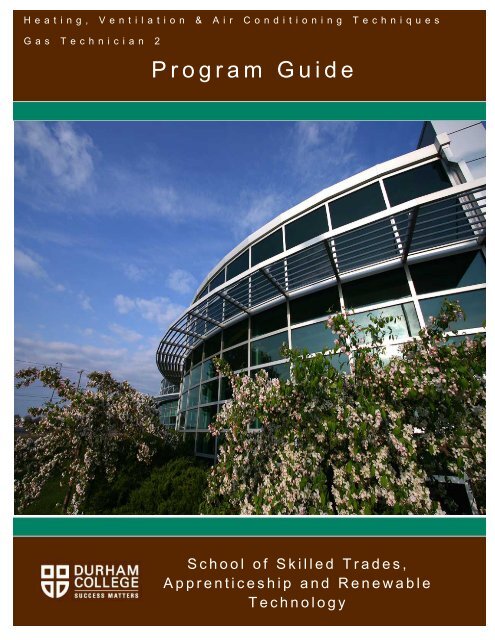
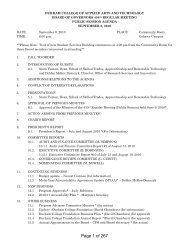

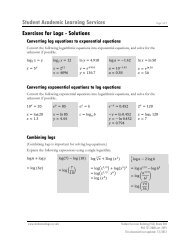
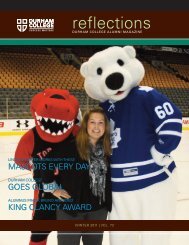
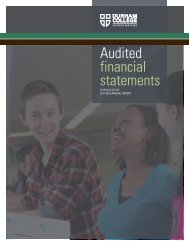
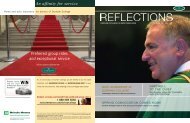
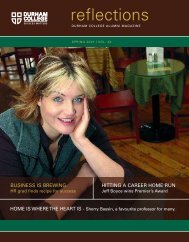
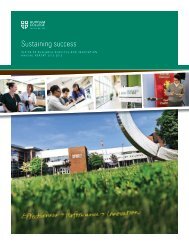
![Annual Report 2007 – 2008 [PDF - 942 KB] - Durham College](https://img.yumpu.com/46399542/1/190x245/annual-report-2007-2008-pdf-942-kb-durham-college.jpg?quality=85)
